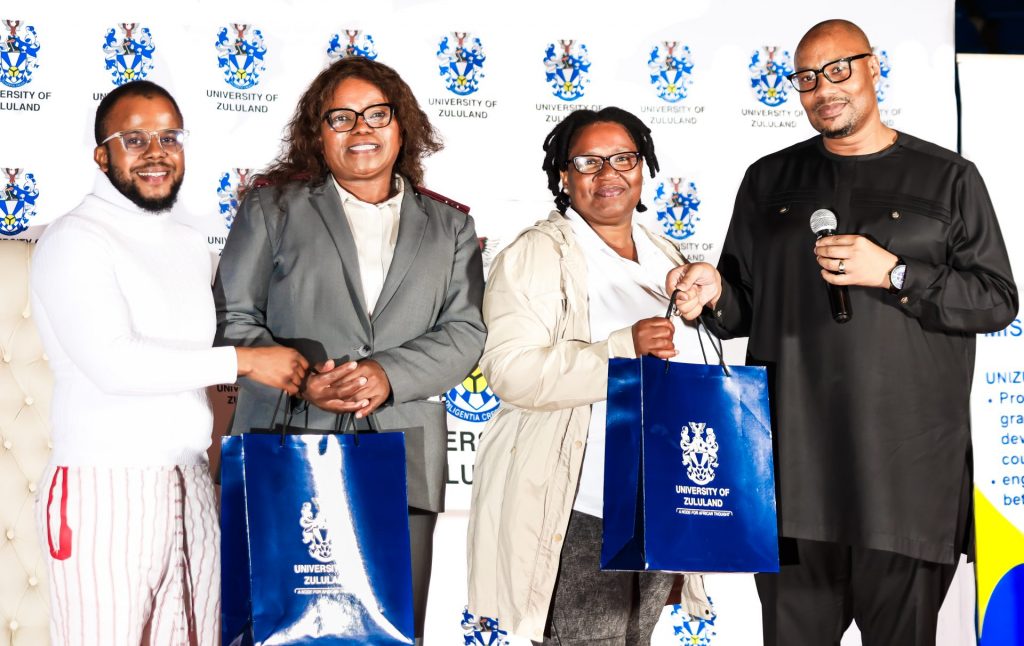Young Women Reminded of Importance of Owning Their Brand During Women’s Dialogue

“Owning one’s brand” emerged as the overarching message during the Women’s Dialogue held on Thursday, 11 April 2024 at the King Bhekuzulu Hall in the University of Zululand’s (UNIZULU) KwaDlangezwa Campus.
The dialogue was co-organised by the Pastoral Care Unit and Transformation and Social Inclusion Office with the intent of instilling in young women the understanding that they can – and ought to- play an active role in creating their own identity, setting boundaries for themselves and prioritising their health. This message was carried out by three coordinators who touched on two themes: “Finding Me in Me” and “Sexuality, HIV/AIDS and GBV”.
With a crowd of over 200 female students, the event truly reflected the essence of a dialogue as it was interactive while also being informative.

Soon after ascending to the podium, Dr Fikile Xaba, a lecturer in UNIZULU’s Department of Social Work, broke the ice by calling onto stage six volunteers whom she challenged to introduce themselves leading with an adjective that best described them. This, it would later appear, was the coordinator’s own introduction to the topic “Finding Me in Me” as the exercise prompted the volunteers to first do an introspection before describing themselves to the audience.
She shared that, according to psychology, each child is born with a blank slate which society then writes on. The type of society one comes from therefore influences them. Being a woman with a brand surpasses this level, because it entails the individual now taking charge of their lives – writing the pages of their own book.
“How do you become a woman with a brand?” Dr Xaba asked the audience. Some of the responses from the floor included being focused, having goals and values, and setting one’s own boundaries, all of which the coordinator endorsed. She further unpacked this subject matter through the five Ps of personal branding: Personal, Pointed, Purposeful, Prioritised and Profitable. She said one’s brand needs to reflect their true self and be built around their values, strengths and weaknesses and their passions. It needs to specific so that everyone can clearly detect what one stands for. The personal brand, she continued, ought to be clear as to what one wishes to achieve and must align with one’s personal goals and objectives. She added that personal branding needs one to invest in it for it to come to fruition. Finally, Dr Xaba said the brand must eventually work for the person; it needs to help the person achieve their set career or life goals.
The students were urged to begin developing their brands now to ensure a brighter future for themselves. Dr Xaba implored them to assess whether their habits and daily activities would eventually them lead to completing their academic journeys. “You must prioritise things that are urgent like completing your studies,” she said adding that time management is key in this regard.
Finally, she encouraged the young women to each have “a personal advisory board”, people who add value, mentor and guide them.

The topic of personal branding was so enthralling that it filtered to the other two slots allocated to Sister Hlengiwe Zulu from the Campus Health Clinic and Professor Delarise Mulqueeny from the Department of Social Work.
Both Sister Zulu and Prof Mulqueeny shared their inspirational stories of transitioning from being in toxic relationships in which they were subjected to gender-based violence to rebranding themselves through education. Prof Mulqueeny also shared her experience of living with HIV for over 20 years, with the hope of encouraging the attendees to always stay protected.
During her slot, Sister Zulu also emphasised the essence of using protection during sexual intercourse as a way of guarding oneself from contracting either HIV or STIs. She reminded the students that the University clinic offers PREP for those who know that they are at risk of contracting the virus. She raised concerns about the increasing number of females who abuse alcohol and other substances and those who are promiscuous, thereby flagging these circumstances that may put young women in harm’s way.
This was the first instalment of a series of dialogues to be held this year which are geared towards empowering the female student to become a well-rounded individual.
- Naledi Hlefane
Pictures: Samkele Sokhela













